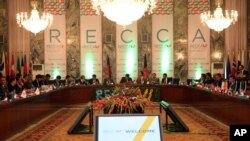Officials from more than 30 nations and 40 international organizations on Thursday kicked off a two-day regional conference in Kabul to discuss ways of rebuilding war-ravaged Afghanistan's finances.
Meeting against the backdrop of tight security following recent deadly bombings in the Afghan capital, the Regional Economic Cooperation Conference on Afghanistan (RECCA) convenes amid rising unemployment in the country, adding to its security challenges.
Opening the event, Deputy Foreign Minister Hekmat Khalil Karzai touched on key policy themes of the conference — including inter-regional trade, synchornized customs and border routines, and market expansion — by emphasizing the need for enhanced regional economic and transportation cooperation.
“Afghanistan is ready and open for cooperation with all countries of the region at various levels and modes and in various fields like labor exchanges, energy, infrastructure, etcetera," he said. "Our engagement with our partners should not be perceived as opposing the interest of another partner.”
Karzai did not name any country, but was apparently responding to concerns that India and neighboring Pakistan are engaged in a proxy war on Afghan soil in their bid to influence security-related matters, a charge both India and Pakistan routinely dismiss.
Land-locked Afghanistan uses Pakistani land routes and seaports for trade under a bilateral transit deal, while Islamabad trades goods with central Asian nations through Afghanistan.
Kabul is anxious to use Pakistani land routes for bilateral trade with India. Islamabad, however, has linked that privilege to normalization of relations with New Delhi. Afghan leaders have in the past warned of reversing the transit agreement if its requests are not entertained. Karzai indirectly raised the issue Thursday at the conference.
Pakistani National Security Adviser Sartaj Aziz, who is scheduled to attend Friday, is slated to to meet with President Ashraf Ghani and other senior Afghan leaders to emphasize the need for peace talks with the Taliban.
The discussions come amid tension between Afghanistan and Pakistan over allegations that Islamabad failed to act against Taliban insurgents operating from Pakistan. Islamabad calls the charges baseless.
This is the 6th RECCA conference and the first since President Ghani assumed office a year ago pledging to end the war with the Taliban and reform the economy.
Economists have forecast 2.5 percent growth this year, after Afghanistan averaged 9 percent annually from 2003 to 2012, according to World Bank figures.
The drawdown of international troops last year has vastly shrunk the war economy that had provided employment for thousands of Afghans. Unemployment is on the rise, pushing increasing numbers of Afghans into the arms of the insurgents.
Portions of this report are from The Associated Press.




